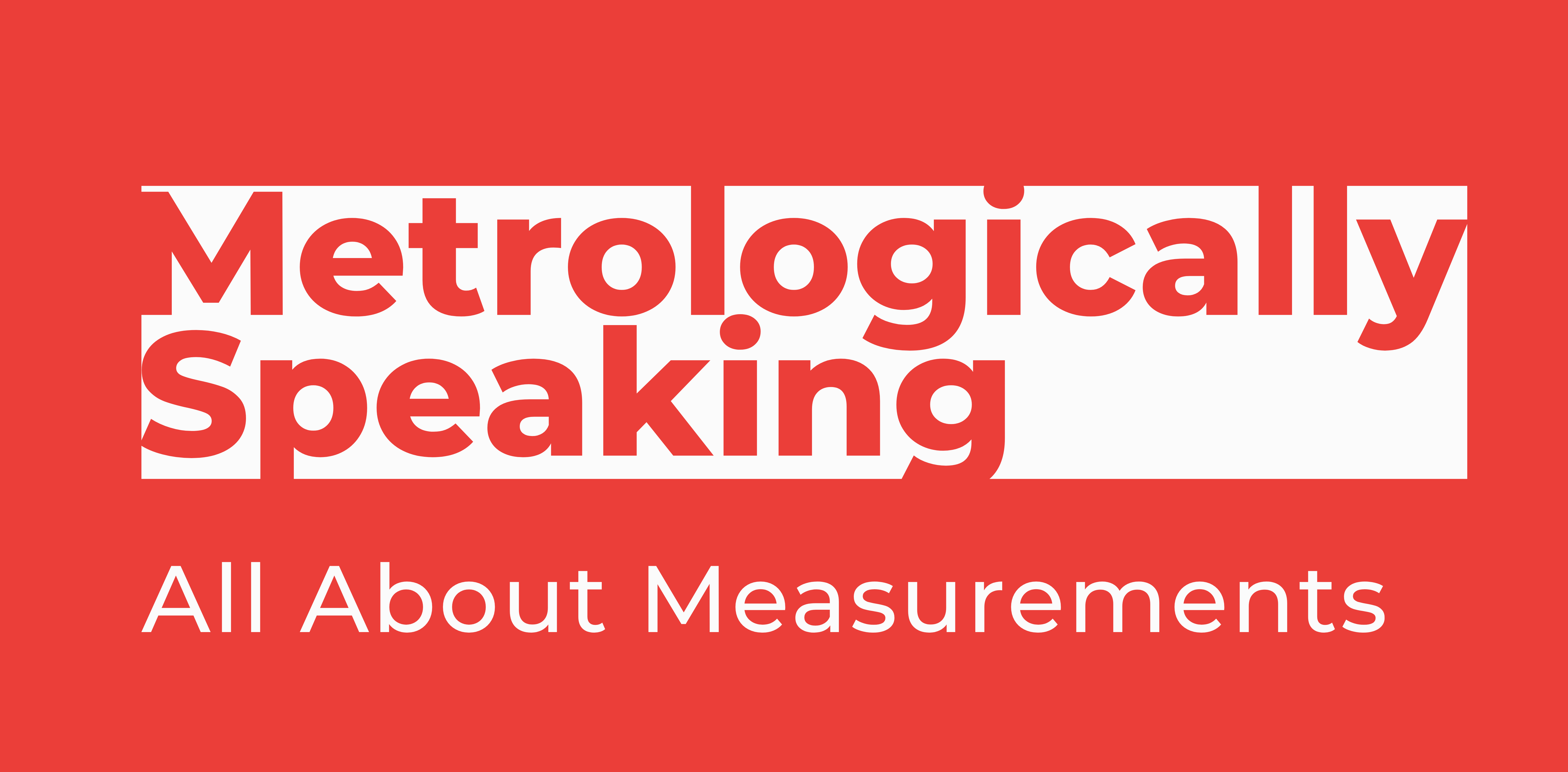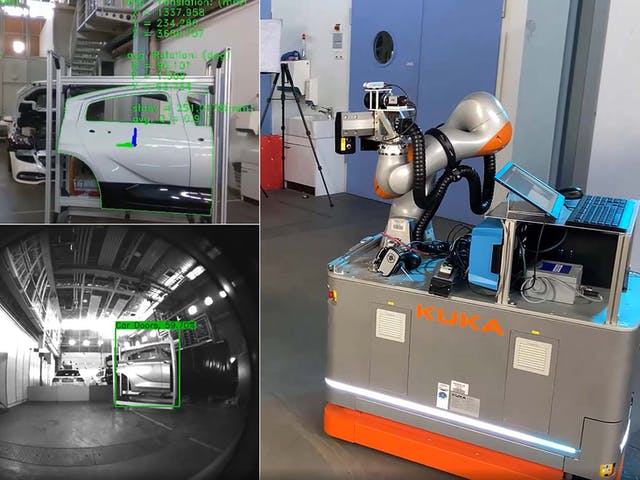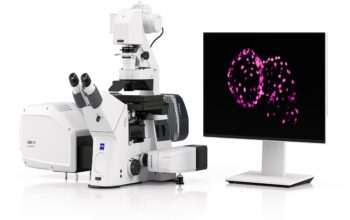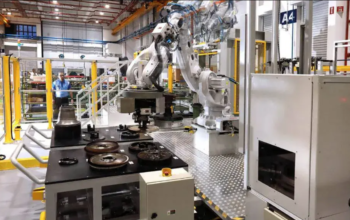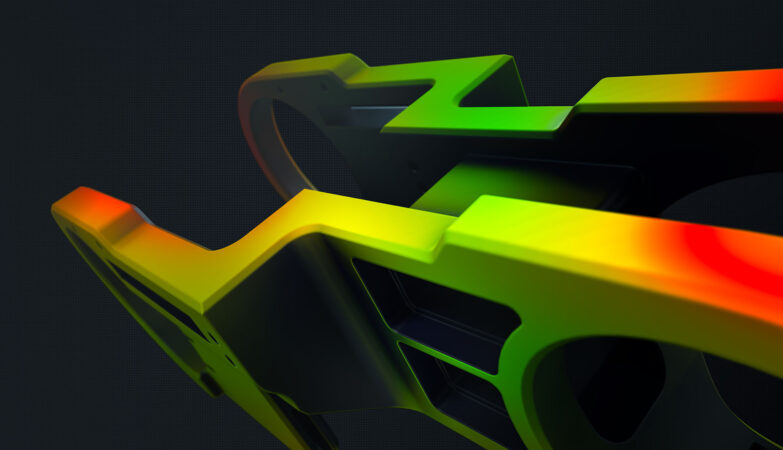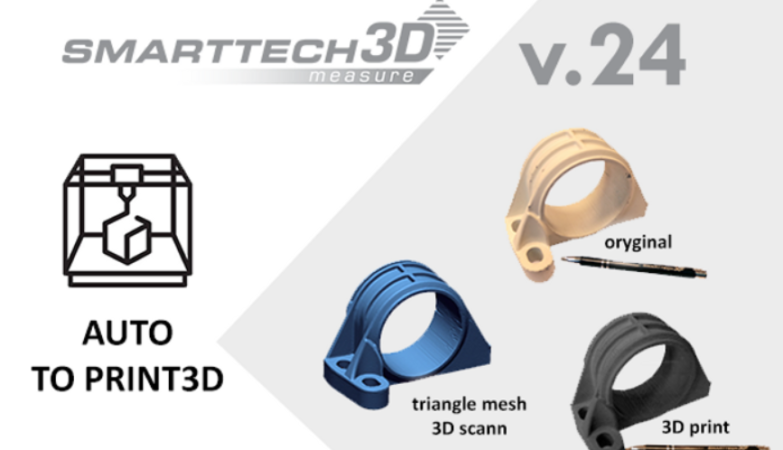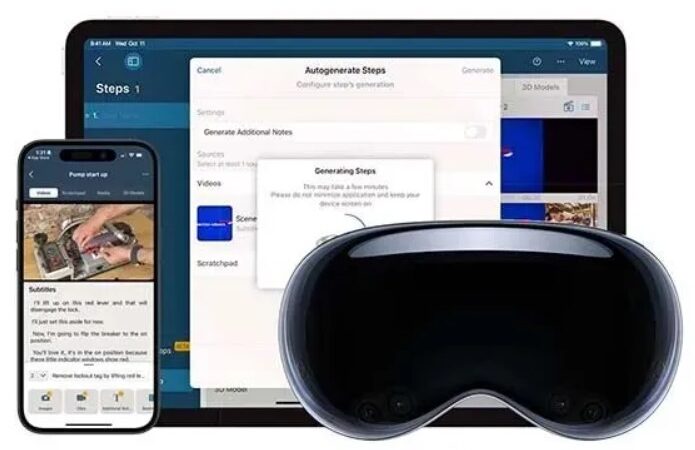Measuring robots independently find their way to the measurement object and autonomously execute measurement plans
- Trend towards more modularity and higher variant diversity in production requires a more flexible quality assurance.
- Consortium of ZEISS, Institute for Laser Technologies in Medicine and Metrology (ILM), Institute for Metrology, Control and Microtechnology (MRM) at the University of Ulm and BMW has successfully researched a future-proof solution.
Oberkochen, Germany | October 2021 | ZEISS Industrial Quality Solutions
As a leading provider of innovative solutions in the field of inline measurement technology such as the new ZEISS AICell trace product category, which combines real-time process monitoring and metrologically traceable inline measurement technology in a single cell, ZEISS knows its customers’ requirements and their strategies through its active exchange with them. With funding from the German Federal Ministry of Education and Research (BMBF), ZEISS has researched and developed the concept of an autonomous measurement robot (AuMeRo) in response to these developments in a consortium with partners BMW, the Institute for Metrology, Control and Microtechnology (MRM) at the University of Ulm and the Institute for Laser Technologies in Medicine and Metrology (ILM). A fully functional specimen has already proven this year that the AuMeRo can fully handle tasks such as the inspection of gap dimensions and flushness on unpainted or painted car body parts.
“A rigid production line for a standard product on which the largest possible number of units is produced – this established concept could soon be a thing of the past”, states Manuel Schmid, Product Manager at ZEISS IQS. Increasingly individual customer demands are leading to a growing number of product variants and thus to the need for modularization in their production. Industries particularly affected by this, such as the automotive industry, are therefore planning in the long term to dissolve sequential manufacturing processes with highly specialized stations and replace them with flexibly deployable manufacturing islands.

Combined competencies for an intelligent, autonomous system
The AuMeRo is a rectangular platform with wheels at the bottom and a robotic arm with an optical measurement sensor at the top. “Of course, this hardware aspect is not revolutionary in itself,” explains Dr. Matthias Karl from Corporate Research at the ZEISS Group. “The key task was to create the necessary intelligence on the software side for autonomous movement to the object, its measurement and data processing.” To meet this challenge in the research project, the research partners combined their respective areas of expertise.
The Institute for Metrology, Control and Microtechnology at the University of Ulm has a focus on autonomous driving in collaboration with several car manufacturers. It therefore developed and implemented the navigation solution for the mobile measurement platform, which enables it to move autonomously to the target object while safely avoiding obstacles. The Institute for Laser Technologies in Medical and Metrology researched suitable optical measurement techniques for the special application, focusing on multi-wavelength holography. ZEISS, as the group coordinator, was represented by two departments, ZEISS Industrial Quality Solutions (IQS) and Corporate Research: ZEISS IQS contributed the application-specific optical metrology, while ZEISS Corporate Research handled the movement of the robotic arm, object recognition and measurement pose control using optical image recognition in conjunction with machine learning. The application partner BMW, as one of the leading premium car manufacturers, gave the project a tangible practical context.
Meeting individual customer requirements and increasing efficiency at the same time
“The user selects an object via software, for example a vehicle door, its rough location and then the intended measurement plan. From this point on, AuMeRo acts fully autonomously,” explains Manuel Schmid. Object recognition happens via camera and is based on a digital twin of the object. For the actual measurement, the mobile platform is equipped with additional optical sensors: For this purpose, ILM developed a special measurement sensor with advantages for short measurement times and robust environmental influences, which uses multi-wavelength digital holography. In this way, topographic data of an entire area for diffuse and/or specular reflective surfaces can be obtained within one snapshot. After the platform has found and approached the object, the robotic arm moves the measuring head according to the requirements from the measuring program, taking into account the current spatial conditions. “With its ability for autonomous mobility and object recognition, AuMeRo is ready for a future in which mobile, modular manufacturing islands are the norm, and allows measurement to take place wherever and whenever it is needed,” Schmid says. “However, it can already play out its full benefits for manufacturers, for example in product audits, where currently measurement and documentation are done manually in the measuring room. With AuMeRo, this is much more efficient, because it is fully automated and reproducible with consistently high quality and informative value of the generated measurement results.”
“With the research project, we have been able to demonstrate that the concept works without restriction and can be easily adapted to new objects and measurement plans. This has opened the doors for this technology,” says group coordinator Dr. Matthias Karl. Jan-Klaus Dziergwa, Project Manager Car Body Engineering, Quality Management BMW Group, is enthusiastic about the result: “At BMW, we are highly interested in fulfilling individual customer wishes and at the same time continuously increasing the efficiency of our production and quality assurance. This requires innovative methods and technologies, and AuMeRo is an excellent example of this.”
Press Contact
Bernd Balle
ZEISS Industrial Quality Solutions
Phone: +49 7364 20-8148
bernd.balle@zeiss.com
About ZEISS
ZEISS is an internationally leading technology enterprise operating in the fields of optics and optoelectronics. In the previous fiscal year, the ZEISS Group generated annual revenue totaling 6.3 billion euros in its four segments Semiconductor Manufacturing Technology, Industrial Quality & Research, Medical Technology and Consumer Markets (status: 30 September 2020).
For its customers, ZEISS develops, produces and distributes highly innovative solutions for industrial metrology and quality assurance, microscopy solutions for the life sciences and materials research, and medical technology solutions for diagnostics and treatment in ophthalmology and microsurgery. The name ZEISS is also synonymous with the world’s leading lithography optics, which are used by the chip industry to manufacture semiconductor components. There is global demand for trendsetting ZEISS brand products such as eyeglass lenses, camera lenses and binoculars.
With a portfolio aligned with future growth areas like digitalization, healthcare and Smart Production and a strong brand, ZEISS is shaping the future of technology and constantly advancing the world of optics and related fields with its solutions. The company’s significant, sustainable investments in research and development lay the foundation for the success and continued expansion of ZEISS’ technology and market leadership. ZEISS invests 12 percent of its revenue in research and development – this high level of expenditure has a long tradition at ZEISS and is also an investment in the future.
With over 34,000 employees, ZEISS is active globally in almost 50 countries with around 30 production sites, 60 sales and service companies and 27 research and development facilities. Founded in 1846 in Jena, the company is headquartered in Oberkochen, Germany. The Carl Zeiss Foundation, one of the largest foundations in Germany committed to the promotion of science, is the sole owner of the holding company, Carl Zeiss AG (status: 31 March 2021).
Further information at www.zeiss.com
ZEISS Industrial Quality Solutions
ZEISS Industrial Quality Solutions is a leading manufacturer of multidimensional metrology solutions. These include coordinate measuring machines, optical and multisensor systems, microscopy systems for industrial quality assurance as well as metrology software for the automotive, aircraft, mechanical engineering, plastics and medical technology industries. Innovative technologies such as 3D X-ray metrology for quality inspection round off the portfolio. In addition, ZEISS Industrial Quality Solutions offers a broad global spectrum of customer services with ZEISS Quality Excellence Centers close to its customers. The company is headquartered in Oberkochen. Production and development sites outside Germany are located in Minneapolis in the USA, Shanghai (China) and Bangalore (India). ZEISS Industrial Quality Solutions is part of the Industrial Quality & Research segment.
More information about ZEISS
Bayrische Motoren Werke AG (BMW)
With its four brands BMW, MINI, Rolls-Royce and BMW Motorrad, the BMW Group is the world’s leading premium manufacturer of automobiles and motorcycles. The company set the course for the future at an early stage and consistently makes sustainability and efficient resource management central to its strategic direction, from the supply chain through production to the end of the use phase of all products. The BMW Group production network comprises 31 production and assembly facilities in 15 countries; the company has a global sales network in more than 140 countries.
University of Ulm, Institute for Metrology, Control and Microtechnology (MRM)
The Institute of Metrology, Control and Microtechnology at the University of Ulm has been working in the field of automated systems with a focus on automated driving for more than 15 years. Currently, more than 15 scientific staff members are involved in this topic. The methodological focus is on basic sensor signal processing of video, LIDAR and radar sensors, information fusion, multi-object tracking, environment modeling with situational understanding and action planning of autonomous systems.
Institute for Laser Technologies in Medicine and Measurement at the University of Ulm (ILM)
The Institute for Laser Technologies in Medicine and Metrology at the University of Ulm (ILM) conducts research in selected areas of photonics / optics and transfers the technologies developed into industrial and medical practice. The most important fields of application include medicine and dental technology, production metrology, process analytics, agricultural & environmental sensor technology, and sensor technology for autonomous systems.
